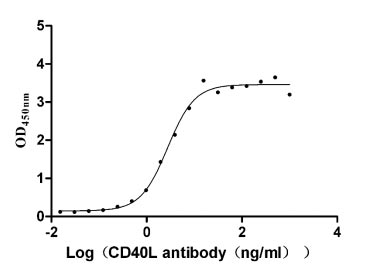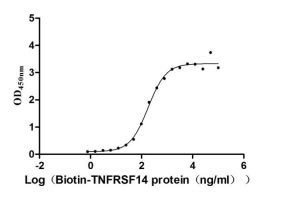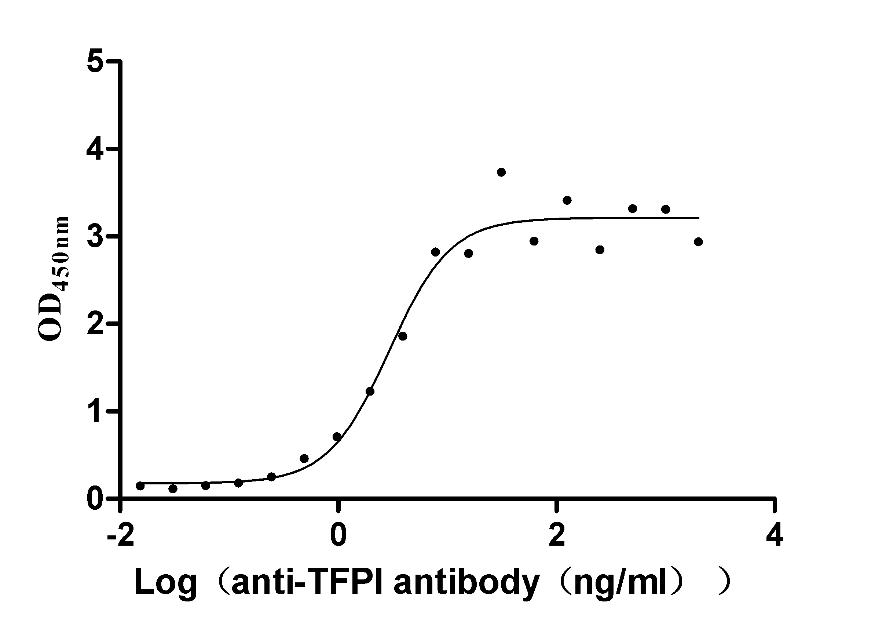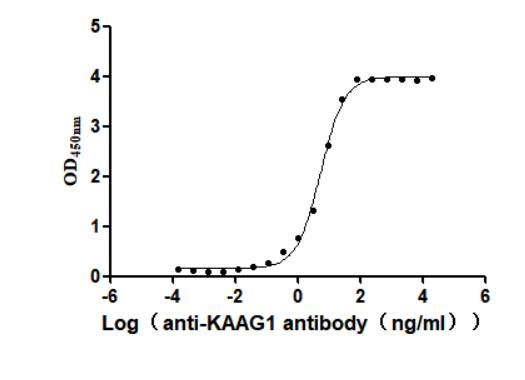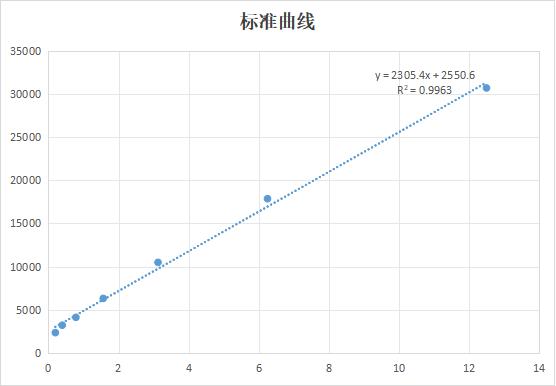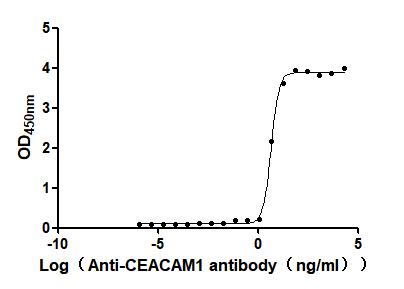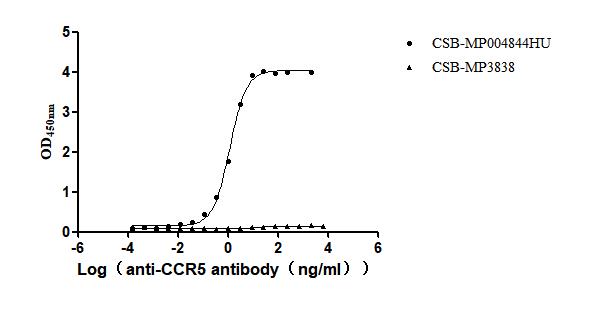Recombinant Human Tumor necrosis factor alpha-induced protein 8-like protein 2 (TNFAIP8L2)
-
货号:CSB-YP754193HU
-
规格:
-
来源:Yeast
-
其他:
-
货号:CSB-EP754193HU
-
规格:
-
来源:E.coli
-
其他:
-
货号:CSB-EP754193HU-B
-
规格:
-
来源:E.coli
-
共轭:Avi-tag Biotinylated
E. coli biotin ligase (BirA) is highly specific in covalently attaching biotin to the 15 amino acid AviTag peptide. This recombinant protein was biotinylated in vivo by AviTag-BirA technology, which method is BriA catalyzes amide linkage between the biotin and the specific lysine of the AviTag.
-
其他:
-
货号:CSB-BP754193HU
-
规格:
-
来源:Baculovirus
-
其他:
-
货号:CSB-MP754193HU
-
规格:
-
来源:Mammalian cell
-
其他:
产品详情
-
纯度:>85% (SDS-PAGE)
-
基因名:TNFAIP8L2
-
Uniprot No.:
-
别名:AW610835; FLJ23467; Inflammation factor 20; Inflammation factor protein 20; TIPE2; TNF alpha-induced protein 8-like protein 2; TNFAIP8-like protein 2; TNFAIP8L2; TP8L2_HUMAN; Tumor necrosis factor alpha induced protein 8 like 2; Tumor necrosis factor alpha-induced protein 8-like protein 2
-
种属:Homo sapiens (Human)
-
蛋白长度:full length protein
-
表达区域:1-184
-
氨基酸序列MESFSSKSLA LQAEKKLLSK MAGRSVAHLF IDETSSEVLD ELYRVSKEYT HSRPQAQRVI KDLIKVAIKV AVLHRNGSFG PSELALATRF RQKLRQGAMT ALSFGEVDFT FEAAVLAGLL TECRDVLLEL VEHHLTPKSH GRIRHVFDHF SDPGLLTALY GPDFTQHLGK ICDGLRKLLD EGKL
-
蛋白标签:Tag type will be determined during the manufacturing process.
The tag type will be determined during production process. If you have specified tag type, please tell us and we will develop the specified tag preferentially. -
产品提供形式:Lyophilized powder
Note: We will preferentially ship the format that we have in stock, however, if you have any special requirement for the format, please remark your requirement when placing the order, we will prepare according to your demand. -
复溶:We recommend that this vial be briefly centrifuged prior to opening to bring the contents to the bottom. Please reconstitute protein in deionized sterile water to a concentration of 0.1-1.0 mg/mL.We recommend to add 5-50% of glycerol (final concentration) and aliquot for long-term storage at -20℃/-80℃. Our default final concentration of glycerol is 50%. Customers could use it as reference.
-
储存条件:Store at -20°C/-80°C upon receipt, aliquoting is necessary for mutiple use. Avoid repeated freeze-thaw cycles.
-
保质期:The shelf life is related to many factors, storage state, buffer ingredients, storage temperature and the stability of the protein itself.
Generally, the shelf life of liquid form is 6 months at -20°C/-80°C. The shelf life of lyophilized form is 12 months at -20°C/-80°C. -
货期:Delivery time may differ from different purchasing way or location, please kindly consult your local distributors for specific delivery time.Note: All of our proteins are default shipped with normal blue ice packs, if you request to ship with dry ice, please communicate with us in advance and extra fees will be charged.
-
注意事项:Repeated freezing and thawing is not recommended. Store working aliquots at 4°C for up to one week.
-
Datasheet :Please contact us to get it.
相关产品
靶点详情
-
功能:Acts as a negative regulator of innate and adaptive immunity by maintaining immune homeostasis. Negative regulator of Toll-like receptor and T-cell receptor function. Prevents hyperresponsiveness of the immune system and maintains immune homeostasis. Inhibits JUN/AP1 and NF-kappa-B activation. Promotes Fas-induced apoptosis.
-
基因功能参考文献:
- Our results demonstrated that TIPE2 is a novel tumor suppressor gene that inhibits GC growth may mediated via AKT and IkappaBalpha phosphorylated activation. PMID: 30157801
- Low TIPE2 expression is associated with Gastric cancer. PMID: 30015980
- The results of the present study indicated that TIPE2 acts as an inhibitor of hepatocellular carcinoma cell growth and aggressiveness, and promotes apoptosis, thus suggesting that TIPE2 may inhibit the metastasisassociated PI3K/AKT signaling cascade and may arrest the tumor cell cycle. PMID: 29568863
- The expression of TIPE2 in THP1 cells may be upregulated by Poly I:C. PMID: 28849057
- In conclusion, for the first time, we discovered that the Th2 milieu is able to upregulate TIPE2 expression in macrophages, which facilitates the change in macrophage phenotype and function and, in turn, potentially exaggerates eosinophilic inflammation and disease progression in chronic rhinosinusitis with nasal polyps. PMID: 28665518
- TIPE2 may participate in T2DM by regulating TNF-alpha production PMID: 28626770
- Our study identifies the molecular mechanisms underlying the interplay of TNF-alpha, TIPE2, and apoptosis during allograft rejection, and it suggests that both TNF-alpha and TIPE2 might be potential targets for the successfully grafted corneal endothelium. PMID: 29480366
- TIPE2 inhibited the expression of asthma-related inflammatory factors in hyperstretched BEAS-2B cells by suppressing the Wnt/beta-catenin signaling pathway. PMID: 28188409
- TIPE2 might be associated with immune clearance of patients with chronic hepatitis B. PMID: 28390195
- TIPE2 could play important roles in maintaining the maternal-fetal tolerance and decreased TIPE2 expression in the decidua may be related to the development of missed abortion. PMID: 28851386
- TIPE2 suppressed tumor invasiveness and angiogenesis in non-small cell lung cancer via inhibiting the activation of Rac1 and subsequently weakening its downstream effects, including F-actin polymerization and VEGF expression. PMID: 27556698
- Further MD simulations confirmed the dynamic stability of these lipids in the TH domain. This computational analysis thus provides insight into the binding mode of phospholipids in the TH domain of the TIPE family of proteins. PMID: 27783229
- the expression of TIPE2 protein could be a predictor of better prognosis for DLBCL. PMID: 27578327
- Insufficient expression of TIPE2 might be involved in the hyperreactivity of monocyte to Toll-like receptor ligands in primary biliary cirrhosis. PMID: 26644386
- data provided the first evidence that TIPE2 inhibits gastric cancer cell migration, invasion and metastasis very probably via reversal of EMT, revealing that TIPE2 may be a novel therapeutic target for human gastric cancer EMT and metastasis. PMID: 28186089
- s demonstrated that TIPE2 overexpression may suppress proliferation, migration, and invasion in prostate cancer cells by inhibiting the PI3K/Akt signaling pathway. PMID: 27712587
- TIPE2 suppressed breast cancer tumorigenesis, growth and metastasis possibly via regulation of the AKT and p38 signaling pathways. PMID: 27779698
- these data suggest that TIPE2 overexpression inhibited hypoxia-induced Wnt/beta-catenin pathway activation and EMT in glioma cells. PMID: 27656836
- this study shows that TIPE2 contributes to the pathogenesis of ankylosing spondylitis PMID: 27816498
- TIPE2 expression was significantly decreased in human breast cancer tissue and cell lines. Overexpression of TIPE2 inhibited the proliferation in vitro and tumor xenograft growth in vivo. TIPE2 also inhibited the migration/invasion of breast cancer cells through preventing the epithelial-to-mesenchymal transition (EMT) phenotype. PMID: 28081733
- Low expression of TIPE2 is associated with hepatocellular carcinogenesis. PMID: 27696294
- our data suggest a previously unappreciated role of TIPE2 in the crosstalk between skin SCC and TAMs and highlight TIPE2 as a promising novel target for skin SCC treatment. PMID: 26577853
- Results provide evidence that TIPE2 acts as an inhibitor of gastric cancer cell growth and triggers an IRF4-associated signaling cascade that promotes p27 expression and restores control of cell proliferation. PMID: 26781452
- The TIPE2-elicited antimetastatic effect in gastric cancer was closely associated with the inhibition of AKT signaling and enhancement of GSK3b activity followed by the degradation and decreased translocation to nucleus of b-catenin PMID: 26530498
- TIPE2 promoted lung cancer cell apoptosis through affecting apoptosis-related molecules caspase-3, caspase-9, Bcl-2 and Bax, possibly via regulating P38 and Akt pathways. PMID: 25946186
- Tumor necrosis factor-alpha-induced protein-8 like-2 (TIPE2) upregulates p27 to decrease gastic cancer cell proliferation PMID: 25536447
- TIPE2 mRNA showed sensitivity of 74.63%, specificity of 90.24%, positive predictive value of 92.5%, and negative predictive value of 67.3% for predicting 3-month mortality in Acute-on-Chronic Hepatitis B Liver Failure. PMID: 26426653
- These results strongly suggest that TIPE2 plays an important role in shifting L-arginase metabolism from production of NO to urea, during host inflammatory response. PMID: 24806446
- Both TNF-alpha and TIPE2 might be potential targets for the treatment of hepatocellular carcinoma metastasis. PMID: 25339267
- TIPE2 might serve as a tumor suppressor in non-small cell lung cancer progression. PMID: 25542151
- TIPE2 can inhibit caspase-8 activity in colon cancer cells. TIPE2 can regulate TLR4 inflammatory effect and inhibit further amplification of cascade reaction via caspase-8. PMID: 24934366
- TIPE2 plays an important role in regulating hepatitis B virus-specific CD8(+) T cell functions in patients with hepatitis B. PMID: 25499447
- Human TIPE2 is an endogenous inhibitor of Rac1 in hepatocellular carcinoma (HCC) by which it attenuates invasion and metastasis of HCC. PMID: 24274578
- TIPE2 mRNA and protein expression were decreased in children with asthma compared with healthy controls. PMID: 24107080
- Letter: detection of TIPE2 in the blood samples may be used as one of the diagnosis molecular markers in clinical monitoring kidney chronic rejection. PMID: 23009108
- TIPE2 is an inhibitor of both inflammation and cancer, and a potential drug target for inflammatory and neoplastic diseases. PMID: 22326055
- The unique expressional profile of human TIPE2 suggests new functions beyond controlling innate and adaptive immunity. PMID: 21459448
- These results indicate that TIPE2 plays an important role in taming Hepatitis B virus-induced hepatic inflammation. PMID: 21466895
- High levels of TIPE2 were detected in monocyte/macrophage derived cell lines and ovarian adenocarcinoma cells, but not detectable or weakly expressed in most human carcinoma cell lines. PMID: 20663561
显示更多
收起更多
-
蛋白家族:TNFAIP8 family, TNFAIP8L2 subfamily
-
数据库链接:
HGNC: 26277
OMIM: 612112
KEGG: hsa:79626
STRING: 9606.ENSP00000357906
UniGene: Hs.432360
Most popular with customers
-
Recombinant Human CD40 ligand (CD40LG), partial (Active)
Express system: Mammalian cell
Species: Homo sapiens (Human)
-
Recombinant Human B- and T-lymphocyte attenuator (BTLA), partial (Active)
Express system: Mammalian cell
Species: Homo sapiens (Human)
-
Recombinant Rabbit Tissue factor pathway inhibitor (TFPI) (Active)
Express system: Mammalian cell
Species: Oryctolagus cuniculus (Rabbit)
-
Recombinant Human Dipeptidase 3(DPEP3), partial (Active)
Express system: Mammalian cell
Species: Homo sapiens (Human)
-
Recombinant Human Kidney-associated antigen 1(KAAG1) (Active)
Express system: Baculovirus
Species: Homo sapiens (Human)
-
Recombinant Human Urokinase-type plasminogen activator(PLAU) (Active)
Express system: Mammalian cell
Species: Homo sapiens (Human)
-
Express system: Mammalian cell
Species: Homo sapiens (Human)
-
Recombinant Human C-C chemokine receptor type 5 (CCR5)-VLPs (Active)
Express system: Mammalian cell
Species: Homo sapiens (Human)


